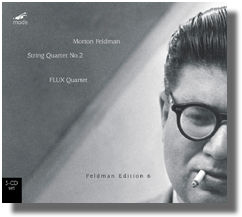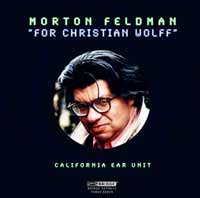Morton Feldman: String Quartet No. 2 
FLUX Quartet
Tom Chiu, violin
Darrett Adkins, cello
Cornelius Duffalo, violin
Kenji Bunch, viola
MODE Feldman Edition 6 / Mode 112 [DVD/A 367 mins]
String Quartet No.2 is a colossal work in one single continuous movement, and it is one of Feldman’s better known chamber music works.
It is also the longest - lasting anything from four to six and a half hours, depending on the choice of tempo and the performers’ stamina. Feldman specifies on the score a tempo of crotchet = 63 – 66. This recording by the Flux Quartet lasts six hours, seven minutes and seven seconds, taken slightly slower than the composer indicates. This does not really make much difference in the general plan and scope of the work or the perception of form because of the work’s elongated overall duration.
This recording is available in two Editions: the first consists of a set of five CDs, and the second, which I listened to and very much prefer, consists of only one DVD. The latter version aims to transfer and recreate the concert experience as realistically as possible and offers a very different and, it must be said, unforgettable listening experience.
In the five-CD version, one is aware of listening to this work in parts, as it is necessary to change the CDs. The listener’s attention span is broken, as one prepares to concentrate on pretty much hour-long sections, which compromises a lot of the composer’s intention. The DVD version allows us to listen to the whole work as it was intended, that is, if one is willing to sit through it in its entirety.
Feldman was particularly fascinated by the patterns of oriental rugs, and he spent hours examining these closely. He aims to transfer this process to the sonic domain, and this mystical work resembles its source of inspiration and extra-musical purpose. This attempt in many ways relates to Scelsi’s approach and his conviction that when you hear one sound for a long time, that sound becomes bigger, it envelops you, and the whole universe exists in that sound. Feldman does something similar here with a pattern that is stretched within a gigantic time span. To achieve this, both composers, by definition, had to use repetitions, or varied repetitions, either written down (Scelsi) or by using repeat marks and signs as in Feldman’s case.
Perception of patterns and textures, of course, is based on memory, and that is really what cements the various parts of this long work together and the listener’s attempt to connect with that process. The work inevitably has a meditative feeling but equally expressive character.
The composition is unattainably long, but it does compensate in context, requiring our maximum attention throughout. Feldman achieves this using a number of strategies: exceedingly soft dynamics (that create the natural tendency to concentrate more), splashes of louder tones at strategic points, change from modality to chromaticism, interplay of small pitch cells and, of course, gorgeous colours frequently achieved through specific position of the bow on the string and harmonics. The Flux Quartet enhances these features, taking the liberty to use vibrato at points, which is not only a highly convincing and successful choice but also one that adds considerable interest to the global timbral palette of the work.
Feldman’s ability and natural instinct to know exactly when to change is astonishing. This is not a piece that loses momentum or interest at any point, and that is due to both the composer’s ingenuity and the Flux Quartet’s imaginative interpretation, which grasps one’s attention from beginning to end. Feldman’s music requires very small variations of sound, dynamics and colour, which can only be more difficult to consistently deliver in such a long work. The ability to show enough variation and contrast without diverting from the original path is really challenging, even for top professionals, but the quartet deliver with the utmost immediacy. When one takes into consideration the natural physical and mental exhaustion, muscle stretching and tiredness, even possibly cramps caused by holding instruments for six hours, not to mention other natural discomforts, all amplified by sitting on a stage that is frequently lit with very bright colours, one can only feel admiration for these performers. This work does not only require highly sensitive musicians, but in some ways, it also requires top musical athletes as well.
Nevertheless, the Flux Quartet are not only true heroes for getting through this work and overcoming all above-mentioned limitations; they were also a joy to my ears from the very first tone produced, solely based on musical merit and musicianship.
It must be noted that Feldman does his best within this exhaustive frame to help the players and, on many well-known occasions, had been very understanding towards his performers, allowing for shorter repetitions of certain passages. It is also very obvious as the work unfolds that he had thoroughly aimed to balance musical and physical tensions; he does not only know when to move on and to change texture and character but also when the player’s concentration, attention span and focus become dangerously low.
String Quartet No.2 is certainly ambitious and is borderline to what it is possible both from a performer’s and audience’s point of view, and any documentation of that is bound to stay in musical history. Whether this recording will reach a wide audience is not for me to say. The truth is that we live in an era when people want immediate gratification and to “get the point” with minimum effort and time. This release is not aimed at this type of audience but towards those people that “really want to get it”, and the only way to get it is to experience it.
For those unfortunate listeners who cannot experience this work in live performance, this recording is a more than adequate alternative. Thumbs up.
Evis Sammoutis
See a selection of reviews at http://www.moderecords.com/catalog/112feldman.html [Editor]
Morton Feldman: For Christian Wolff  (1986) (1986)
California Ear Unit: Dorothy Stone, flute; Vicki Ray, piano, celesta
BRIDGE 9279A/C (Three Hours, Three Discs)
Having enjoyed listening through the 2nd string quartet, I regret to confess that this one, three hours long, has beaten me! Even more austere and definitely an acquired taste.
The dedicatee has written: “I found the experience of listening to it beautiful and interesting – it moves away partly from our (Morty's, John Cage's and mine) original preoccupation with just sound and sonority into areas of self-awareness about listening, being a listener, as such, because there's so much time to be thinking of this and that as well as just listening.”
I have sampled the first and last discs, hearing mostly exchanges of single notes between flute and piano, and I have the middle disc playing on my computer now; pleasant enough as background, the celeste bringing a little variety...
I hope to persuade one of our expert reviewers to tackle it.
Peter Grahame Woolf
|



